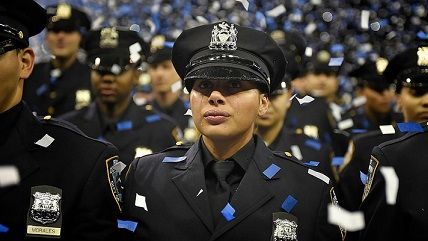Police Debates Need More Policy, Less Emotion
Solutions possible.

The latest debate over policing understandably has become an emotional one, following the horrific murder of police officers in Dallas and Baton Rouge, and the deeply disturbing videos of police officers shooting men to death in Minnesota and Louisiana. Some conservatives say there's a "war on cops" and are demanding a return to "law and order," while many liberals believe there's a police war on minorities and have led protests that sometimes look more like riots.
In a free society, the public has a right—actually, a duty—to look closely at how the government and its employees behave. Here are some crucial policy issues that neither side is discussing:
Police unionization protects bad officers and stifles reform. The current unionized system makes it nearly impossible to discipline, fire or remove problem officers. That's no surprise, given the clout of police unions, which get their way from members of both parties in the state Capitol. A recent study from the Chicago Police Department finds that a tiny percentage of officers cause the preponderance of lawsuits and settlements there, which confirms this point. If agencies could more easily get rid of a handful of officers, there would be fewer problems.
I compare the situation to public education. Because of union-backed work rules, there are some bad teachers, who are nearly impossible to remove from the classroom. Hence, districts engage in the "dance of the lemons," as administrators shuffle around poor performers. The vast majority of teachers are good, professional people, but such a bureaucratic system is immune from reform. It's similar in the world of law-enforcement agencies.
Secrecy aids and abets the worst actors. We all know sunshine is the best antidote to corruption and other ills. Because of union muscle-flexing at the state Capitol, it's been a non-starter for civil libertarians to secure even modest oversight laws of police agencies. In 2006, the California Supreme Court ruled in the Copley Press, Inc. v. Superior Court decision that police disciplinary proceedings are not public, thus barring the public and media from learning about allegations of misconduct. Efforts to alter that ruling have been beaten back repeatedly. Problem officers can continue to wreak havoc without anyone outside the department knowing about it.
Cops increasingly view the people as cash cows. After the Ferguson, Missouri, riots, most on both the left and right were focused on the shooting incident that sparked the fracas. But a federal Department of Justice report explained why so many residents of the mostly African-American suburb were so upset (even before the race-baiters came to town). As Bill Moyers reported last March, "DOJ found that the city 'exhorts' police to maximize revenue via stops, citations and arrests, and in some cases punishes them for failing to meet targets….Hunger for revenue influences how officers act, resulting in excessive uses of force—with Tasers and dogs—violations of free speech and unreasonable stops or arrests, according to the DOJ."
Drug war and militarization ramp up the hostility. This "cash cow" phenomenon is driven by the drug war. In a free society, police are not supposed to be an occupying army, but a trusted part of the community. The drug war has militarized local police and created an antagonistic situation—a siege mentality– especially in poorer and minority neighborhoods.
"Simply put, the police culture in our country has changed," the late San Jose Police Chief Joe McNamara wrote years ago in the Wall Street Journal. "An emphasis on 'officer safety' and paramilitary training pervades today's policing, in contrast to the older culture, which held that cops didn't shoot until they were about to be shot or stabbed."
There are other issues, too. Our nation has too many picayune laws police must enforce. The "3 percent at 50" pension scheme in California incentivizes officers to retire early, thus depriving departments of older, less-aggressive officers.
The videos aren't going away. It really is time for soul searching by police authorities, who are so accustomed to getting their way at the Capitol they forget the words emblazoned on the side of many squad cars: "Protect and Serve." Right now, the best way to serve the public is to look deeply at the policies at the heart of the current unrest.


Show Comments (21)